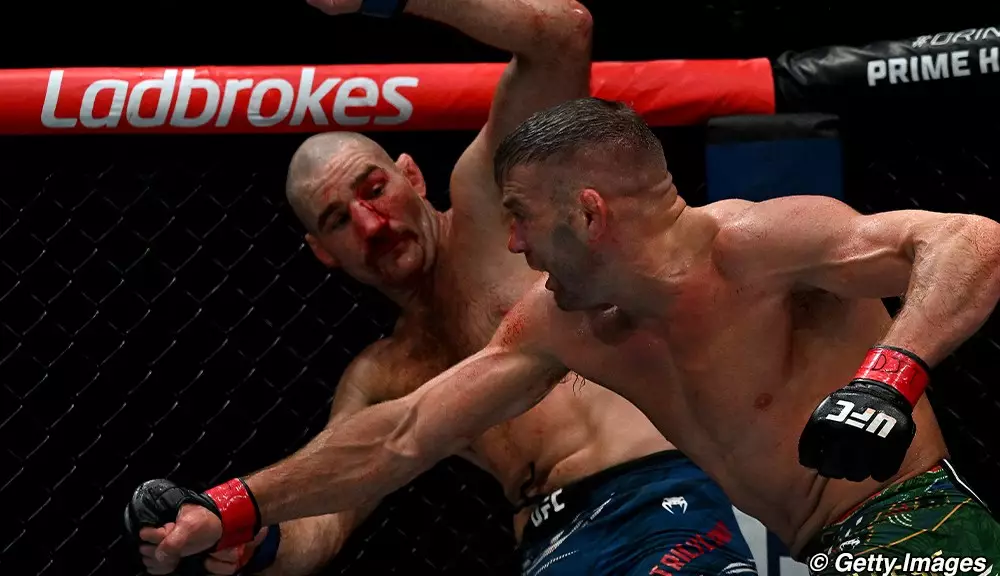Sean Strickland’s recent return to the octagon at UFC 312 against Dricus Du Plessis proved to be a tumultuous affair, not just within the fight but in the lead-up to it. While he ultimately lost the match by unanimous decision, the narrative surrounding his performance was colored by a series of personal and physical challenges that he felt compelled to share with the public. Strickland, a seasoned fighter with a record of 29 wins and 7 losses, described a training camp riddled with adversities, notably a staph infection and a significant arm injury that he likened to a fractured bone.
The timing and nature of these issues raised questions about Strickland’s readiness for such an important fight. As images surfaced showcasing the staph infection on his arm, Strickland’s fortitude came into question. Admitting that his physical condition was less than optimal, he emphasized that he was not seeking to justify his defeat but rather shed light on the circumstances that surrounded his preparation.
Strickland’s comments reveal a fighter grappling not only with physical ailments but also with an internal battle of self-perception and mental health. He candidly admitted to struggling with self-esteem even before entering the fight world—a poignant acknowledgment that sets the landscape of his journey. In his video, he expressed frustration over the “back of your head” nagging realization that something was amiss throughout his training. This psychic load can weigh heavily on an athlete, creating conflict between advocating for oneself during rigorous training and acknowledging the harsh realities of one’s body.
His comment about undergoing stem cell treatment in Colombia underscored the extremes to which he had well-documented resilience. Faced with an injury that could sideline many, he pressed forward, albeit reluctantly, embedding deeper into the physical and psychological toll that such conditions can create for an athlete. Strickland’s bravado of recognizing the need to “sack up” resonates with many who appreciate the relentless drive to push past barriers, regardless of effectiveness.
Criticism from coaches and public figures looms large for fighters, and Strickland’s acknowledgment of his coach Eric Nicksick’s remarks speaks volumes about the dynamics within such relationships. Coaches hold a vital role in an athlete’s journey, and Strickland’s willingness to address his trainer’s comments indicates a maturity and understanding of the constructive nature of accountability. It can be a precarious balance to maintain as a fighter; however, it remains important to note that attributing performance solely to external factors can detract from one’s personal agency in both defeat and success.
Though Strickland’s encounter with Nicksick publicly criticized his performance, the fighter was unambiguous in his respect for Du Plessis, citing the opponent’s capabilities and determination during the bout. Strickland’s lack of animosity towards his competitor showcases a level of sportsmanship that transcends the immediate aftermath of loss. Not every fighter can balance the reality of defeat while simultaneously recognizing the talents of their opponents—this speaks to Strickland’s character.
Despite facing setbacks, Strickland is resolutely looking towards the future with a realistic approach. His proclamation of starting “from f*cking square one” is emblematic of an athlete’s journey, especially one who acknowledges the cyclical nature of fighting—victories can often quickly fade into the backdrop of future challenges. The fight game is one of perpetual growth, and Strickland’s readiness to head back into the gym reflects a commitment to honing his craft and rectifying past mistakes.
Moreover, his reflections portray a fighter who understands that the most formidable opponent can often be oneself. Embracing vulnerability and transparency about his struggles can serve as a source of inspiration to both fans and fellow fighters alike. Strickland’s ultimate goal, as he stated, is not merely to accumulate accolades but to continue learning and growing from each experience, taking on the next fight with renewed vigor regardless of the hurdles that come along the way.
Sean Strickland’s recent fight against Du Plessis serves as a potent reminder of resilience, accountability, and the intricate balance of mental and physical preparation in combat sports. As he navigates through his career’s next chapter, his candid acknowledgment of struggles and steadfast focus on improvement will undoubtedly resonate with many in the fight community and beyond.

